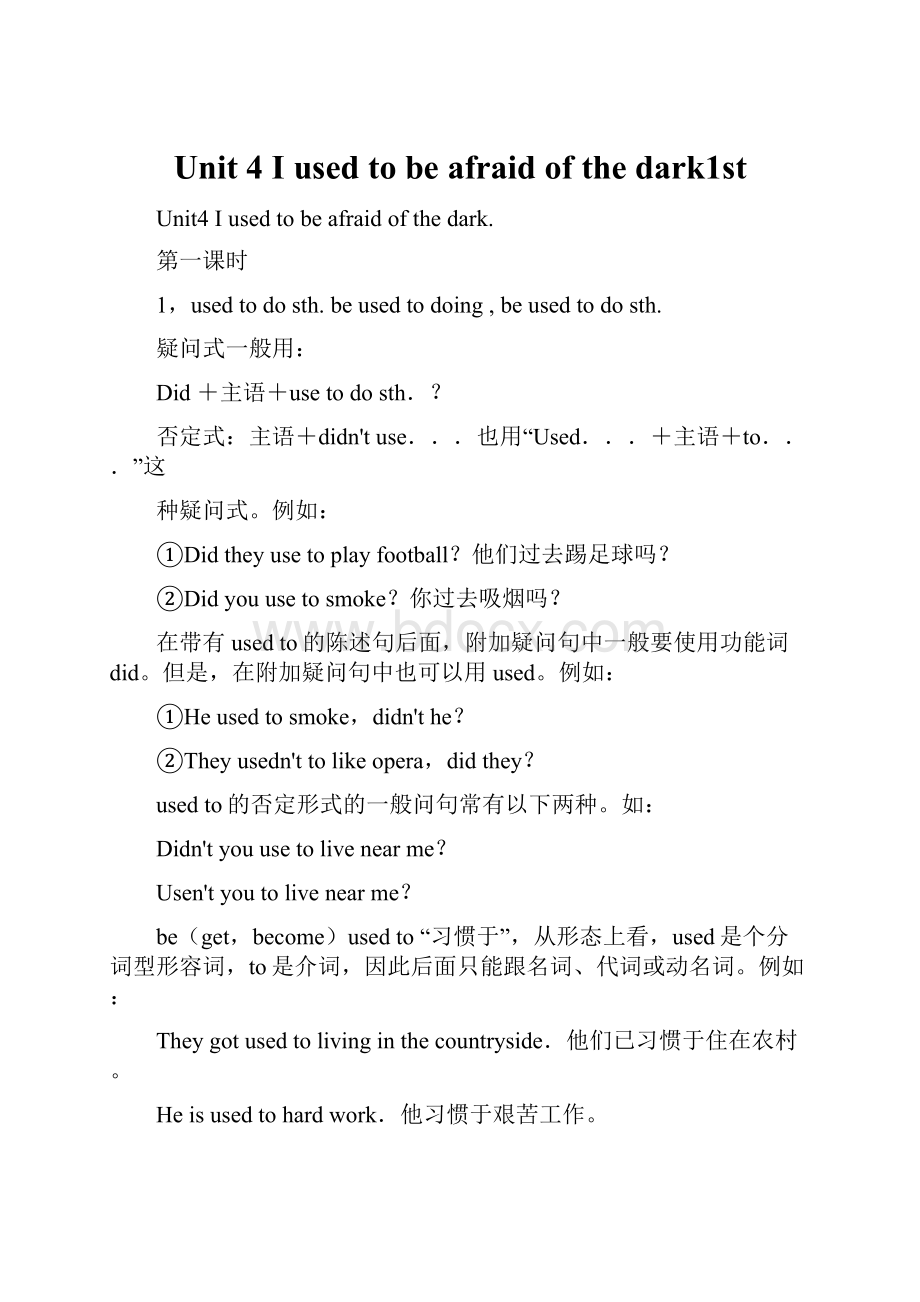Unit 4 I usedto be afraid of the dark1st.docx
《Unit 4 I usedto be afraid of the dark1st.docx》由会员分享,可在线阅读,更多相关《Unit 4 I usedto be afraid of the dark1st.docx(6页珍藏版)》请在冰豆网上搜索。

Unit4Iusedtobeafraidofthedark1st
Unit4Iusedtobeafraidofthedark.
第一课时
1,usedtodosth.beusedtodoing,beusedtodosth.
疑问式一般用:
Did+主语+usetodosth.?
否定式:
主语+didn'tuse...也用“Used...+主语+to...”这
种疑问式。
例如:
①Didtheyusetoplayfootball?
他们过去踢足球吗?
②Didyouusetosmoke?
你过去吸烟吗?
在带有usedto的陈述句后面,附加疑问句中一般要使用功能词did。
但是,在附加疑问句中也可以用used。
例如:
①Heusedtosmoke,didn'the?
②Theyusedn'ttolikeopera,didthey?
usedto的否定形式的一般问句常有以下两种。
如:
Didn'tyouusetolivenearme?
Usen'tyoutolivenearme?
be(get,become)usedto“习惯于”,从形态上看,used是个分词型形容词,to是介词,因此后面只能跟名词、代词或动名词。
例如:
Theygotusedtolivinginthecountryside.他们已习惯于住在农村。
Heisusedtohardwork.他习惯于艰苦工作。
beusedto表示“习惯于某事”的状态,而getusedto则表示由“不习惯”到“习惯于”这一动态的过程,意思是:
“(变得)习惯于”;“开始习惯于”。
试比较:
Hewasusedtothecoldweatherafterhelivedtherefortwoyears.在那里住两年后,他已习惯了寒冷的天气。
Ithinkitisabitdifficultforyoutogetusedtothehumidweatherhere.我想,让你习惯于这里潮湿而炎热的天气有点困难。
You'llsoongetusedtolivinginthecountry.很快你就会习惯于住在乡下了。
beusedtodosth.beusedfordoingsth.是动词use的被动语态,在这种结构里,to是不定式符号。
例如:
Woodisusedtomakepaper.
Woodisusedformakingpaper.
练习题;
1.Maryusedtohavemilkandbreadforbreakfast,____?
A.usedsheB.doesn’tshe
C.didsheD.didn’tshe
2.Myuncle____gotoworkonfoot,butnowhe____goingtoworkbymotorcycle.
A.usedto;isusedto
B.isusedto;usedto
C.isusedto;isusedto
D.usedto;usedto
3.Whatdidthey____todoattheageof19?
A,tousedB.used
C.touseD.use
4.MybrotherhasbeeninLondonfortenyears.Nowhehas____theclimatethere.
A,usedtoB.beenusedto
C.beenuseD.beusedto
5.Stonecan____bridges.
A,usedtobuild
B.beusedtobuild
C.beusedtobuilding
D.usedforbuilding
6.Haveyou____aftersupper?
A,usetohaveawalk
B.beenusedtohavingawalk
C.beenusetohaveawalk
D.beenusedforhavingawalk
2,humorous
humor+ousdangerous,delicious
3,silent:
Stay/keep/remindsilent
asilentmovie
(语法中:
不发音的)
silence:
insilenceSpeechissilver,silenceisgolden.
4,helpfulhelp—helpful/helplessuse---useful/useless
usefulbeautifulwonderfulsuccessfulthankful
behelpfultosb/sth.(friendly/kind/polite)
myfatherhasgivenmeahelpfulsuggestion.
formtimetotime:
attimes,sometimes
5,ton:
atonof+名词复数或不可数名词一吨……,
tonsof+不可数名词大量的……
6,interviewn.接见;会见;会谈
giveaninterviewtosb.接见某人
haveaninterviewwithsb.会见某人
jobinterviews(对申请工作者的)口头审查
aninterviewfor+职业名词
vt.接见;会见;(记者)访问
7,dowith常与连接代词what连用,而dealwith常与连接副词how连用,如:
Idon’tknowhowtheydealwiththeproblem.(=Idon’tknowwhattheydowiththeproblem.)我不知道他们如何处理这个问题。
Heiseasytodealwith.(=Heiseasytodowith.这时“do”是不及物动词)他是容易相处的人。
这两个词组在使用时有细微的差别。
一般地说,dowith表示“处置”、“忍受”、“相处”、“有关”等。
如:
Theyfoundawaytodowiththeelephant.他们找到对付那头大象的办法了。
Ihavenothingtodowithhim.我跟他无任何关系。
dealwith意义很广,常表示“对付”、“应付”、“处理”、“安排”、“论述”、“涉及”等。
如:
Theycouldproperlydealwithallkindsofsituations.他能恰当地应付各种局面。
Theyhavelearnedtodealwithvariouspersons.他们学会了和各种人打交道。
8,dare用作实义动词,此时其后的动词不定式可带to也可不带to,且dare有人称和数以及时态的变化。
例如:
Idaretojumpdownfromthetopofthewall.我敢从那墙头上跳下来。
Shedoesn\'tdare(to)meetherteacher\'seyes.她不敢与老师对视。
2)dare用作情态动词,后跟动词原形,主要用于疑问句、否定句和条件句中。
例如:
Howdareshedothingslikethattome?
她怎么敢对我做那种事?
-Dareyoucatchthemouse?
你敢去抓那只老鼠吗?
-Idaren\'tdothat.我不敢抓。
Ifyoudaresaythattoourteacher,Iwouldvoteforyou.如果你敢向我们的老师说那件事,我就投你一票。
dare[d]v.aux.[用在疑问、否定、条件句中,后接不带to的不定式,没有人称形式,第三人称单数后不加“s”]敢胆敢,竟敢Shedarenotdoit.她不敢做那件事。
Howdarehedistortthefactssobrazenly!
他怎么敢如此肆无忌惮地歪曲事实!
\
9,onguard
10,require
trequiresthat...有...的必要
requiresth.ofsb.对某人有...的要求
requiresb.todosth.要求某人做某事(相当于needtodosth.)
requiredoingsth.(相当于needdoingsth.)
require与request:
的区别
require1.(需要,必要条件):
如:
Mostplantsrequiresunlight大部分植物需要阳光.
2(规定的义务,强迫):
如:
Studentsarerequiredtoattendclasses学生规定要上课
request1.(表达愿望;要求)如:
requestedinformationabouttheexperiment要求看资料;requestedtoseetheevidencefirsthand要求(看到)第一手的证据;requestedthatthebusdriverstopatthenextcorner.要求公交车司机在下一个街角停下
2.(要一个人做一些事情)如:
Thepolicerequestedhertoaccompanythem.警方要求她陪从他们
11,speech n.演说;演讲;言语;语言能力,名词(n.)
giveaspeechto向……发表演说。
makeaspeech
拓展:
sometimessometimesometimesometimes这几个的区别
sometimes有时,偶尔,频度副词
sometime在(将来或过去)某一时候(特指某一点时间,动词用瞬间动词)
sometime某一时候(特指某一段时间,动词用延续性动词
sometimes几次
Hesometimesworksintheday.
IwishIcouldflytothemoonsometime
Healwaysstayswithhisgrandparentsforsometimeafterschool.
Hesaythesentenceforsometimesbutdidn'tgetitright.